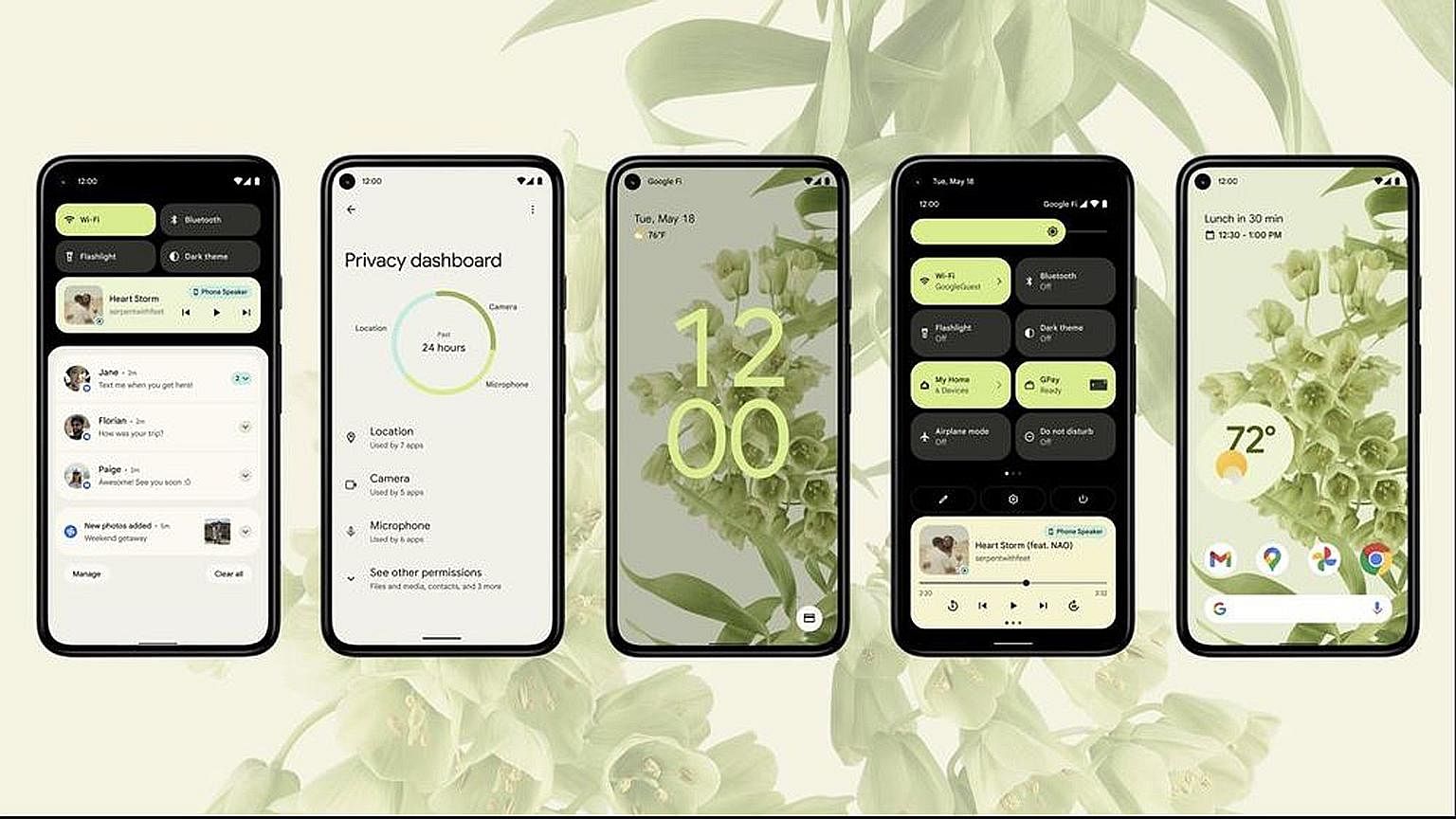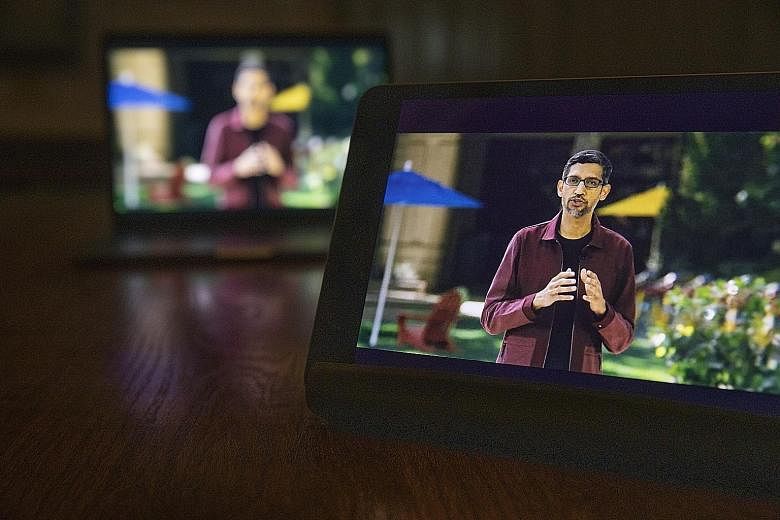MOUNTAIN VIEW • Google is adding to its upcoming Android 12 mobile operating system a new Privacy Dashboard that tells users what type of data was used and when, by which app.
The dashboard also gives users a shortcut to revoking permissions for apps.
The Alphabet company announced the new feature last Tuesday during its I/O developer conference, as part of a package of privacy controls the search giant is pushing out to appease consumers and regulators.
Apart from aesthetic tweaks, some under-the-hood improvements to Android 12 could result in a faster operating system, by reducing the central processing unit time by 22 per cent and cutting system server load by 15 per cent.
Google said that Android 12 would be ready from this autumn, with the Android 12 Beta currently available to select Android devices, including smartphone brands like Xiaomi, ZTE and Google's own Pixel phones.
Another privacy feature Google is adding to Android is an indicator at the top right of the status bar that lets users know which apps are currently using the microphone, camera or both.
This is similar to how Apple's iOS for iPhones has an indicator at the top of the screen to let users know what is in use.
Two new toggles for Android in the Quick Settings pull-down menu allow users to remove app access to the microphone and camera quickly.
Google is also introducing a feature that lets users give their approximate location instead of precise location, which helps protect user privacy for apps that do not require pinpoint locale accuracy, such as weather apps.
Android 12 will be getting Private Compute Core too, which keeps all audio and language processing strictly on the mobile device.

That means that songs under Now Playing, or Smart Reply messages personalised to a user's style, are not available anywhere outside his smartphone. At the same time, the user gets to enjoy the perks of a highly personalised device.
These were among the many announcements Google made at its marquee annual conference, held virtually, which spanned quantum computing, garrulous bots, automated photo animations and dermatology screenings.
Here are some other highlights from Google I/O:
SEARCH CONTROLS
Ever wish you could delete the last thing you searched for on Google? Now Google will let you.
Users now can tap on a tab inside their Google accounts to remove the last 15 minutes of search history.
The company has offered a feature to clear search histories, but people have found that data useful for tools like Maps or been unaware of the ability to delete it.
"We never sell your personal information to anyone," Ms Jen Fitzpatrick, a Google senior vice-president, said at the virtual event. "It's simply off limits."
During the event, Google also introduced new tools for password protections for its Android software, among other things.
"No one else offers this kind of technically enforced, verifiable privacy," Ms Fitzpatrick added.
Apple has spent years positioning its iPhones as far more secure than devices using Google's Android operating system.
WORKPLACE TOOLS
Google opened its I/O conference by unveiling a series of upgrades to Workspace, its collaboration software suite for workplaces.
This underscored the company's desire to position itself as a leader in the less splashy business of enterprise software.
Traditionally, Google has devoted the conference to mobile software. Instead, it led off with a presentation from Mr Javier Soltero, a vice-president hired from Microsoft to manage Workspace.
Mr Soltero introduced a new ability to insert Google Meet video calls directly inside other tools like Docs and Sheets, a direct challenge to Microsoft's Teams product and offerings from Zoom Video Communications.
Google also touted Smart Canvas, a project management feature. This means Google is ploughing forward in a market full of much smaller players, such as Atlassian, Asana and Salesforce.com, which is undergoing a blockbuster acquisition of workplace chat service Slack.
Even Google's most far-out release of the day was framed as an assist to its cloud business.
At the end of the keynote, chief executive officer Sundar Pichai teased a new project called Starline. Using compression technology, Google showed off a way to hold video calls with people as 3D holograms.
"It's as close as we can get to the feeling of sitting across from someone," Mr Pichai said.
"We have spent thousands of hours testing it in our own offices, and the results are promising," he added. "There's also excitement from our lead enterprise partners."
He mentioned media and healthcare companies, but did not offer further details.
Revenue in Google's cloud division grew 46 per cent to US$4.05 billion (S$5.4 billion) during the first quarter. The company does not share Workspace sales.
ADDRESSING 'RACIST' PHOTOS
The tech giant said it has added features to its phone camera and software to better capture people of colour following several embarrassing incidents over the years.
SAMSUNG PARTNERSHIP
Google is teaming up with Samsung on Wear, Google's software platform, to convince more people to buy Android smartwatches.
It means Samsung will use Google's Wear OS for its upcoming Galaxy smartwatches instead of its own Tizen platform.
"We're bringing the best of Wear and Tizen into a single, unified platform," said Google Wear project director Bjorn Kilburn.
"By working together we have been able to take strengths of each and combine them into an experience that has faster performance, longer battery life and more of the apps you love available for the watch."
The combination will allow all device markets to use this platform, creating an ecosystem that could challenge Apple, the long-time leader in the smartwatch segment with about a third of the market, as Google integrates its newly acquired wearables maker Fitbit.
Samsung vice-president Janghyun Yoon said in a separate statement that the South Korean firm "constantly pursues new ways to meet the ever-changing needs of consumers", adding: "That's why we decided to team up with Google... to bring the best of our platforms together into one unified experience."
HARDWAREZONE, BLOOMBERG, AGENCE FRANCE-PRESSE

